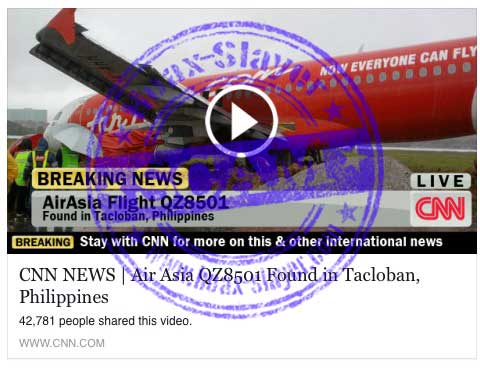Don't Believe These AirAsia Facebook Scams
Don't believe these malicious Facebook scams that pretend to have information about the missing AirAsia Flight 8501.

Every time disaster or tragedy strikes, someone is going to try to make a profit off of other people's curiosity and fear. Nowadays, that usually means online scams: URLs or headlines that seem to lead to important information, but which really link to malware or trick users into paying money.
This time the exploited tragedy is the missing airliner AirAsia QZ8501, which departed from Surabaya, Indonesia on December 28 and seems to have crashed into the ocean before reaching its destination of Singapore. Scammers are using Facebook to circulate what looks like a CNN article, which claims the plane was found in Tacloban, Philippines. Do not click this link!
MORE: The Five Worst Security Fails of 2014
On Facebook, the malicious link will show up with all the trappings of a CNN video. But the plane depicted is not the one that was lost on December 28; it's another AirAsia plane that skidded off a runway at Kuching International Airport in Malasia in 2011, as scam investigation website Hoax-Slayer reports.
If you do try to click the video, it will not play in Facebook as legitimate videos do; instead you'll be redirected to a malicious webpage that has been carefully crafted to look like an official CNN page. There, a popup will tell you that you must "like" and "share" the video on Facebook before you can view it.
Requiring people to share a video before even seeing it is a major warning sign and a frequent hallmark of Facebook scams; the criminals want to use you, and the trust your Facebook friends have for you, to continue spreading their scam.
Even if you do like and share it, another popup will demand that you complete a survey before you're allowed to view the video. If you click this, you'll be redirected to another website that hosts the survey. The website will claim that taking the survey will make you eligible to win prizes, and will ask for your mobile number and other contact information.
Sign up to get the BEST of Tom's Guide direct to your inbox.
Get instant access to breaking news, the hottest reviews, great deals and helpful tips.

If you give this information, you're actually agreeing to sign up for a shady text messaging service, in which the scammers will send you texts and charge you several dollars per text. You may also start to receive unsolicited marketing calls, says Hoax-Slayer.
And that's not all. Some victims of this scam have seen pop-ups telling them they need to download a "video plugin update" to view the alleged video about the missing AirAsia flight. This is another major warning sign — malware very often pretends to be a video player or video plugin in order to trick people into willingly downloading it. In this case, the "video plugin" is adware that will infect the browser to which you installed it and fill it with unwanted ads.
"Online criminals always quickly exploit disasters such as air crashes. More Flight QZ8501 related scam attempts are likely to be distributed in coming days and weeks," Hoax-Slayer concludes.
You should always be skeptical of Facebook links, even ones your friends seem to have posted. Never agree to spread a video before you've seen it yourself, never give your mobile phone number or other personal information out on strange websites, and be very wary of any video player downloads or plugins you encounter.
In the case of news-related scams such as this one about the AirAsia plane, instead of clicking on a suspicious link you can verify the news yourself by going straight to a trustworthy source. That way you'll know you're on a real news site and not a webpage carefully crafted to seem like one.
- How to Protect Yourself from Data Breaches
- 12 Security Mistakes You're Probably Making
- Best Antivirus Software
Jill Scharr is a staff writer for Tom's Guide, where she regularly covers security, 3D printing and video games. You can follow Jill on Twitter @JillScharr and on Google+. Follow us @tomsguide, onFacebook and on Google+.
Jill Scharr is a creative writer and narrative designer in the videogame industry. She's currently Project Lead Writer at the games studio Harebrained Schemes, and has also worked at Bungie. Prior to that she worked as a Staff Writer for Tom's Guide, covering video games, online security, 3D printing and tech innovation among many subjects.
-
clutchc In fact, don't believe half what you read online. Maybe even less than that. Biggest purveyor of mis-information ever invented: Internet. The WWW to be exact.Reply
